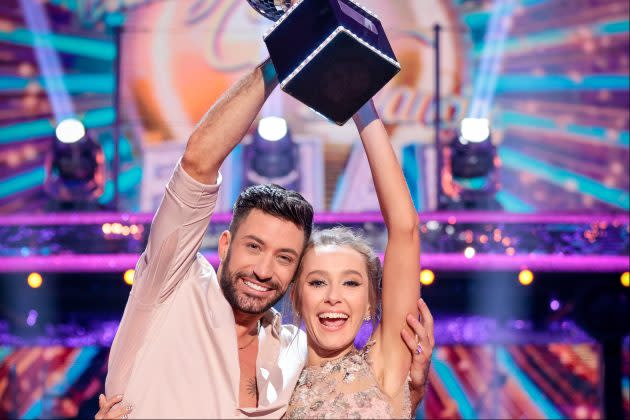Alternative MacTaggart Lecturer Rose Ayling-Ellis Reveals Crushing Pressure Since Becoming “The Poster Girl For The Deaf Community” – Edinburgh TV Festival
- Oops!Something went wrong.Please try again later.
- Oops!Something went wrong.Please try again later.

Alternative MacTaggart lecturer Rose Ayling-Ellis has revealed the crushing pressure of feeling like “the poster girl for the deaf community” as she urged the TV world to “be braver and have the courage to make changes.”
The deaf Strictly Come Dancing winner and EastEnders actor told of a string of examples of how representation and access can be improved for disabled talent in the UK TV sector as she became the first disabled person to deliver the alternative address previously helmed by the likes of Russell Brand and Jerry Springer.
More from Deadline
Having won the BBC’s biggest entertainment show last Christmas and captured the nation’s hearts, she has had a whirlwind year but questioned “how many deaf characters have we seen on TV since?”
“Although [Strictly] was a beautiful experience, the aftermath hasn’t always been,” she revealed.
“I was thrown to suddenly find myself considered a deaf pioneer, the poster girl for the deaf community. It came with new pressures that I’d never experienced before.”
Ellis, who is EastEnders’ first and only regular deaf character, revealed programs in development have been cancelled over the past year because she had “decided not to be part of them.”
“Saying no meant other deaf people lost opportunities too and it leaves me feeling guilty and conflicted,” she said, in a heartfelt address.
Ellis, who chose to speak the lecture rather than use BSL, pointed out that there are 11M deaf or hard of hearing people in the UK but just 201 on acting database Spotlight, of which 56 use BSL.
She said she was rejected from Spotlight for years as she “didn’t go to drama school or have an agent, yet I couldn’t get into drama school because it was not accessible.”
“How is a young deaf actor supposed to get their foot in the door, when the door is firmly shut on them from the start?” said Ellis.
Ellis stressed the difference between representation and access and urged gatekeepers to consider both.
She turned to her early days in a theater production, when the director “realized that to create an authentic and layered character, they would need to commit time and so, rather than put in the effort, chose to change my character to be hearing to make things easier for them.”
“It is not a one off, I have heard time and time again of deaf actors having similar experiences on other productions in theatre and TV, with their identity being considered a burden that has to be compromised,” said Ellis.
‘Fighting to have my identity represented’
She credited EastEnders with “giving me lots of opportunities and enabling me to grow and develop my skills as an actor” but said working with scripts that are written by hearing people can be “frustrating,” leaving her “constantly fighting to have my deaf identity represented but end up being made to feel like my voice isn’t heard.”
“This isn’t meant as a criticism of the show in question, it is something that happens across the board and needs to be accepted as a problem by the whole industry.”
Writers will pen deaf characters “who are in a room with a big group of people arguing with each other, following everything that is being said and even repeating things back to them,” said Ellis, “or they will write my character as lipreading someone from impossibly far away – like I have a superpower.”
She called for deaf consultants to be brought into work with the writing teams, a move that is often forgotten due to the fast-paced nature of TV production.
The Strictly Come Dancing production team “let me share my story in my way and look at what that did,” she said, citing her BAFTA win for Must-See Moment of the Year following her silent dance with partner Giovanni Pernice and the ensuing increase in online searches of BSL courses by an incredible 4000%.
Ellis concluded by urging producers to “have a good, hard look at your productions and ask yourself: where are the deaf and disabled talent and, if you are working with deaf and disabled people, have you asked them if they feel that they are appropriately supported?”
“I hope you walk away from this and take action; I hope that you push yourselves to be braver and have the courage to make changes; and I hope that you reach out to us and to me, because I am so ready for you to see what I can do, and I won’t stop until you listen.”
Best of Deadline
Venice Golden Lion Winners : Photos Of The Festival’s Top Films Through The Years
'Meet Cute' Photo Gallery: Kaley Cuoco And Pete Davidson Star In Comedy About Falling In Love
Sign up for Deadline's Newsletter. For the latest news, follow us on Facebook, Twitter, and Instagram.

